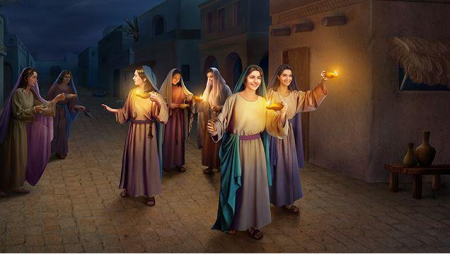The Ten Virgins
Matthew 25:1–13
Then shall the kingdom of the heavens be likened to ten virgins, who taking their lamps came out to meet the bridegroom. And five of them were prudent, and five foolish. Those who were foolish, taking their lamps, did not take oil with them. And the prudent took oil in their vessels with their lamps. And while the bridegroom delayed, they all slumbered and slept.
And in the middle of the night there was a cry made, “Behold, the bridegroom comes; come out to meet Him.” Then all those virgins arose and adorned5 their lamps. And the foolish said to the prudent, “Give us of your oil, because our lamps are extinguished.” And the prudent answered, saying, “Not so, lest there not be sufficient for us and for you. But go rather to those who sell, and buy for yourselves.”
But when they were gone to buy, the bridegroom came; and they who were prepared went in with him to the wedding; and the door was shut. And afterwards the rest of the virgins came also, saying, “Lord, Lord, open to us.” And he answering said, “Amen I say to you, I have not known you.” Watch therefore, because you do not know the day nor the hour in which the Son of Man comes.
AE 252:8. This [parable] is about conjunction with the Lord, by love and faith. Moreover this [is what] the “wedding” signifies. “Oil” signifies the good of love, and “lamps” the truth of faith.
To make clear that in every particular that the Lord spoke there is a spiritual sense, I will lay open the particulars of the spiritual sense of this parable.
- “The kingdom of the heavens,” to which the ten virgins are likened, means heaven and the church.
- “The ten virgins” signify all who are of the church. “Ten” means all, and “virgins” those who are in the affection of spiritual truth and good, and this affection constitutes the church. Therefore ... in Revelation it is said that “virgins follow the Lamb.”
- “The lamps that they took to go forth to meet the bridegroom” signify the truths of faith.
- “The bridegroom” means the Lord in respect to conjunction with heaven and the church by love and faith. For “a wedding” is treated of, which signifies that conjunction.
- “The five prudent virgins” and “the five foolish” signify those of the church who are in faith from love, and those who are in faith apart from love (the same as “the prudent and foolish” in Matthew 7:24, 26) [about the house on the rock vs. the sand] .
- “Midnight, when the cry arose,” signifies the Last Judgment, and in general the end of man’s life, when he will be judged either to heaven or to hell.
- “The foolish virgins then saying to the prudent, Give us of your oil, and the prudent answering that they should go to them who sell,” signifies the state of all after death—that those who do not have the good of love in faith, or the truth of faith from the good of love, then wish to acquire it for themselves, but in vain, since such as man’s life has been in the world, such he remains.
- From this it is clear what is signified by “the prudent virgins” going in to the wedding, and that the foolish who said, “Lord, Lord, open to us,” received for answer, “Amen, I say to you, I do not know you.” “I do not know you” signifies that the Lord was not conjoined to them, since spiritual love conjoins and not faith without love. For the Lord has His abode with those who are in love and in faith from it, and He “knows” these [people] because He Himself is there [in love and faith].
TCR 719. ...Those who merely understand and talk about what is true and good are like the foolish virgins who had lamps but no oil; while those who not only understand and talk about what is true and good, but also will and do it, are the wise virgins who were admitted to the wedding, while the former stood at the door and knocked, but were not admitted.
AC 4636. That by this parable the Lord described His own coming, is evident from the particulars, and from the end, where He says, “Watch therefore, for you do not know the day nor the hour in which the Son of man comes.” [See also AC 4638:6 about why the prudent could not share with the foolish.]
5 Or prepared
Questions and Comments
- Notice how many parables the Lord tells about the kingdom of the heavens. Heaven, hell, and the life after death were new concepts in the New Testament. Why is heaven frequently compared to a wedding?
- What do you think it means that the bridegroom delayed, and that they slumbered and slept?
- What is an example of being spiritually prudent?
- Why must there be a judgment either to heaven or to hell?
- How does this parable help us understand the second coming of the Lord?
| previous |  |
next |
|---|


